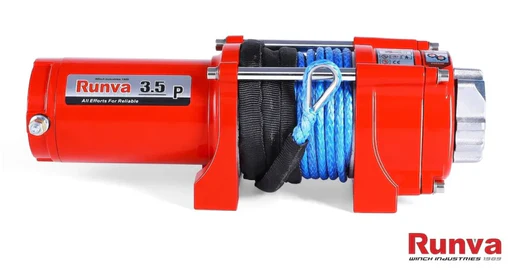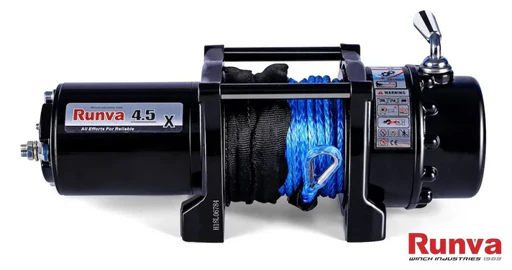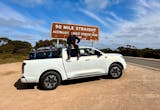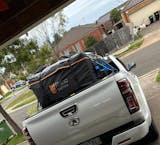Choosing the Best Boat Trailer Winch for Your Boat
When it comes to boat trailer winches, picking the right one for the job can be tricky. We're here to help!

One piece of equipment you definitely don't want to overlook is the winch for your boat trailer. Unless your boat lives in a harbor and never leaves the water, this piece of equipment is a must. Like a fish needs water, a boat owner needs a boat winch. That piece of gear that lowers your boat off and pulls it back onto your boat trailer. Whether you're upgrading your current setup or fitting out a new trailer, picking the right winch can make loading and unloading your boat a breeze (or a pain).
In this article, we're going to walk you through everything you need to know to choose the perfect winch for your boat trailer. From understanding the basics of winches to considering factors like boat size, weight, and which winch is right for your requirements. So, grab a cuppa, sit back, and let's dive into the world of boat trailer winches!
TABLE OF CONTENTS
- WHAT IS A BOAT TRAILER WINCH?
- THE DIFFERENT TYPES OF BOAT TRAILER WINCHES
- MANUAL BOAT TRAILER WINCHES
- ELECTRIC BOAT TRAILER WINCHES
- FACTORS TO CONSIDER WHEN SELECTING A BOAT TRAILER WINCH
- HOW TO CALCULATE YOUR REQUIRED WINCH CAPACITY
- MANUAL OR ELECTRIC?
- CONCLUSION
What is a Boat Trailer Winch?
Let’s start with the basics. A winch is a mechanical device that is used to pull in (wind up) or let out (wind out) or otherwise adjust the tension of a rope or wire rope (also called "cable" or "wire cable"). In other words, it's a handy tool that helps you load and unload your boat onto your trailer. The winch is mounted on the trailer and works by winding a cable or strap to pull the boat out of the water and secure it onto the trailer (or vice-versa).
The Different Types of Boat Winches
There’s really only two types of boat trailer winches worth talking about, and that’s the manual (hand-operated) winches and the electric winches. Each has their own advantages and disadvantages, and which one suits you will be determined by your personal needs and requirements.
Below is a quick summary of the two types of winches. We delve deeper into the differences further down.

Manual Boat Trailer Winches
Manual winches, also known as hand winches, require physical effort to operate. They come with a crank handle that you turn by hand to wind the cable or strap.
Pros of a Manual Boat Trailer Winch:
- Generally more affordable.
- Simple to install, use and maintain.
- Doesn't require a power source so less can go wrong.
Cons of a Manual Boat Trailer Winch:
- Operating the winch can be physically demanding, especially for larger boats.
- Slower operation compared to electric winches.
- Doesn't require a power source so less can go wrong.
Electric Boat Trailer Winches
Electric boat winches are powered by an electric motor, which makes the process of loading and unloading your boat much easier and faster. They are operated via a switch or remote control.
Pros of an Electric Boat Trailer Winch:
- Requires minimal physical effort.
- Quick and efficient operation.
- Ideal for larger boats or frequent use.
Cons of a Electric Boat Trailer Winch:
- More expensive than manual winches.
- Requires a power source, typically a 12V battery.
- More complex, with a higher potential for maintenance issues.
Within the electric winch category it is worth noting the difference between a standard electric winch and an electric boat winch, which often gets missed.
A standard electric winch that one might consider suitable for a boat trailer would typically be a utility or ATV winch. These are small versatile winches that are used across a broad range of applications, from being mounted on quad bikes and other small vehicles, to being used in warehouses or even farms and agriculture environments. They are not specifically designed for boat trailers.
While these winches make great boat trailer winches, they do have some caveats worth mentioning. The most important being that they don’t include a manual override crank. This means that if your boat has a power or engine failure, the winch will stop operating and you’ll have no means of still using the winch to load your boat onto the trailer.

The image above shows an electric 4500lb ATV winch on the left, and an electric 4300lb boat trailer winch on the right.
A dedicated boat trailer winch will always have a manual override crank built in. So if a power issue does happen, you’ll be able to use the hand crank to pull the boat onto the trailer. This is a small but important consideration. In saying this, we sell heaps of standard electric winches that are installed on boat trailers and have yet to hear of a power failure that leaves the skipper stranded.
Components of a Boat Trailer Winch
Understanding the main components of a winch can help you make an informed decision when choosing the right one for your boat trailer. Here’s a breakdown of the key parts:
Winch Drum
The drum on a winch is a cylindrical spool around which the cable or strap is wound. It's the central part of the winch that facilitates the winding and unwinding process.
As you operate the winch, the drum rotates to either pull in or let out the rope or strap. The size and design of the drum can affect the winch's capacity and performance.
Winch Motor (for Electric Winches)
The motor is where the muscle lives in electric winches. It's typically an electric motor that runs on a 12V battery, the same kind used in cars or boats.
The motor drives the winch’s operation, making it possible to pull in or let out the rope or strap with minimal physical effort. The motor is usually activated via a button or clutch control on the winch itself, or via a wired or wireless remote. Most of the electric boat winches also have wireless remote capability which makes it even more convenient to operate.
Winch Gear Train
The gear train consists of a series of gears that transmit power from the handle (in manual winches) or motor (in electric winches) to the drum.
The gears determine the winch’s gear ratio, which affects how easy it is to operate the winch and how much force it can apply. A higher gear ratio means more mechanical advantage but slower operation, while a lower gear ratio means faster operation but requires more effort or power.
Boat Trailer Winch Cable, Rope or Strap
This is the line that connects the winch to the boat. Winch cables are typically made of either steel cable or synthetic rope materials, while straps are usually made of durable, heavy-duty webbing.
The cable, rope or strap transfers the pulling force from the winch to the boat. The material and length of the cable or strap can affect the winch’s capacity and how it handles the load. A good winch rope comes with a specified rating, indicating the weight it is able to pull before failure (i.e. it snaps).

We generally recommend synthetic rope or strap for your boat winch as it’s easier to handle than steel cable, and won’t rust. It does require a little more maintenance though, to keep it in good shape.
When choosing a winch, it's important to consider the specifications and quality of these components to ensure they match the demands of your boat and trailer. This will help ensure safe and efficient operation whenever you're out on the water.
Factors to Consider When Choosing a Boat Trailer Winch
Boat Size and Weight
When selecting a winch for your boat trailer, one of the most critical factors to consider is the size and weight of your boat. Ensuring that the winch can handle the weight of your boat is essential for safe and efficient operation.
Importance of Matching the Winch Capacity to the Boat’s Weight
Using a winch with insufficient pulling capacity can lead to equipment failure, potential damage to your boat and trailer, and safety hazards. On the other hand, a winch that is too powerful may be unnecessarily costly, heavy and over-engineered for your needs. Matching the winch capacity to your boat’s weight ensures smooth and reliable loading and unloading, reducing strain on the winch and other components.

How to Calculate the Required Winch Capacity
To calculate the required winch capacity, you need to consider not only the weight of your boat but also additional factors such as the incline of the ramp and friction. A general rule of thumb is to choose a winch with a capacity of at least 1.5 to 2 times the weight of your boat. Here’s a simple formula to help you determine the right capacity:
Winch Capacity = Boat Weight × Incline Factor × Friction Factor
Boat Weight: This is the total weight of your boat, including any gear, fuel, and equipment on board.
Incline Factor: The steepness of the boat ramp affects the winch capacity needed.
Here are some typical incline factors:
Flat surface: 1.0
Slight incline (up to 10 degrees): 1.2
Moderate incline (10 to 20 degrees): 1.5
Steep incline (over 20 degrees): 2.0
Friction Factor: This accounts for the resistance between the boat hull and the trailer bunks or rollers.
Typical friction factors are:
Rollers: 1.0
Carpeted bunks: 1.2
Rubber bunks: 1.5
Example Calculation
Let’s say you have a boat that weighs 1,000 kg, and you typically use a ramp with a moderate incline of 15 degrees and carpeted bunks.
Boat Weight: 1,000 kg
Incline Factor: 1.5 (for a 15-degree incline)
Friction Factor: 1.2 (for carpeted bunks)
Winch Capacity = 1,000 kg × 1.5 × 1.2 = 1,800 kg
In this example, you should choose a winch with a capacity of at least 1,800kg (4000lb) to ensure it can handle the load safely. We’d typically recommend a little more than 4000lb, just to cater for those unexpected scenarios where the incline factor might be a 2.0, and your boat might have a full tank of gas and a lot of gear on it. Rather be a little over prepared than under. A 4500lb electric boat winch, like the Runva 4.5X would be ideal in this case.
By considering the weight of your boat and the conditions you typically encounter, you can select a winch that is both appropriate and reliable, making your boating experience smoother and more enjoyable.
Selecting the Type of Boat Winch that Best Suits your Needs: Manual vs. Electric
Let’s revisit the differences between the electric boat winches and their manual boat winch counterparts. When choosing a winch for your boat trailer, deciding between a manual and an electric winch is a key consideration. Each type has its own set of advantages and disadvantages that can influence your decision based on your specific needs and preferences.
Pros and Cons of Manual Winches

Manual Trailer Winch Pros:
Manual Boat Winches are Cost-Effective: In general, manual winches are more affordable compared to electric winches. They have fewer components, making them less expensive to purchase and maintain.
Winch Simplicity: With fewer moving parts and no need for electrical connections, manual winches are simpler to install and operate. This also means there's less that can go wrong. There’s no chance of draining your vehicle’s battery (assuming you don’t use a spare) and no chance of the motor burning out or packing up.
Winch Reliability: Manual winches are durable, hardy and less prone to failure, making them a dependable option for occasional use. They’re generally made from galvanised steel with little to no plastic parts. What you see is what you get. Turn crank, rope winds onto drum, boat comes up. Easy.
No Power Source Needed (Besides your Arm of Course): Since they don't require electricity, manual winches can be used anywhere without worrying about battery life or power supply.
Manual Trailer Winch Cons:
Physical Effort: Operating a manual winch requires significant physical effort, especially when dealing with larger boats. This can be tiring and time-consuming. Depending on the winch can also depend on the effort required. How many gears and the gear ratio will all make a difference. But regardless, it’s still work, and if it’s a hot day and you’re in a hurry, it can be a real pain.
Slower Operation: Manual winches are generally slower to use compared to electric winches, as they rely on you manually cranking them to wind or unwind the cable or strap. And even if you fancy yourself a speedy winder, you can only go so fast safely.
Limited Capacity: Manual winches typically have lower weight capacities than electric winches, which may limit their suitability for larger boats. Most manual winches top out at the 4000lb (1800kg) capacity limit, while electric winches don’t have a capacity ceiling worth noting.
Lastly, another con with manual winches that we don’t see mentioned enough is the fact that while you’re lowering your boat, you are required to be standing next to the winch while you crank away. Most electric boat winches have the option of a wireless remote control, allowing you to move around your trailer while you lower or pull your boat.
Pros and Cons of Electric Winches

Electric Trailer Winch Pros:
Ease of Use: Electric winches require minimal physical effort to operate. With just the push of a button or remote control, you can easily load and unload your boat.
Speed and Efficiency: Electric winches are much faster than manual winches, making the process of loading and unloading your boat more efficient.
Higher Capacity: Electric winches are designed to handle heavier loads, making them suitable for larger boats.
Remote Control Options: Many electric winches come with wired or wireless remote controls, allowing you to operate the winch from a distance, providing convenience and safety. Having the ability to move around your boat while you winch it up or down the trailer can be very useful.
Electric Trailer Winch Cons:
Higher Cost: Electric winches are generally more expensive than manual winches, both in terms of initial purchase price and ongoing maintenance. A good quality low capacity electric boat winch can cost upwards of $350, where the equivalent manual version is around $120.
Power Dependency: Electric winches require a power source, typically a 12V battery. This means you need to ensure your battery is charged and in good condition. It also requires you have a power supply available at the trailer, this can mean running power lines from your battery, or installing a battery closer to the trailer.
Complexity: Electric winches have more components, which can increase the likelihood of malfunctions or the need for repairs. Installation can also be more complex (see power source requirements).
Maintenance: Electric winches require regular maintenance to ensure the motor and electrical components remain in good working order. Most electric winch brands recommend a service once a year. You can usually do this yourself if you’re handy, or take it to an auto-electrician who can do it for you.
Decisions, decisions...
Choosing between a manual and an electric winch depends on factors like the size of your boat, how often you use it, your personal requirements, and your budget.
For smaller boats and occasional use, a manual winch might be sufficient. Let’s say you’re a fit and able person who enjoys taking your 4.2m Bluefin out on the water once every month or two. You don’t mind using a bit of muscle to get your boat onto the trailer, and would like to save a few bucks too. A manual boat winch would suffice.
On the other hand perhaps you’re of retirement age, you like going out a few times a month, but maybe your back isn’t as strong as it once was. Then an electric boat winch would be the better option. You push a button and down your boat goes, smooth and steady, push another button and up it comes onto the trailer. Easy as.
For larger boats we generally recommend an electric winch. They are usually made for handling heavier loads than the equivalent manual winch, so it’s a safer option. The investment in an electric winch will also save you a lot of time and effort.
Electric or Manual Boat Winch Conclusion
Choosing between a manual and an electric winch depends on several factors, including the size and weight of your boat, how often you use it, and your budget. For smaller boats and occasional use, a manual winch may be perfectly adequate and cost-effective. However, if you have a larger boat or plan to use your winch frequently, investing in an electric winch could save you a lot of time and effort, providing greater convenience and efficiency.
Our opinion? If you can afford the price difference, and don’t mind a bit of upfront setup time, we recommend an electric winch every time. Life’s too short to stand around winding a crank.
If you'd like a hand finding the right winch for your boat trailer, feel free to get in touch here. We'd be happy to have a chat and discuss options.








